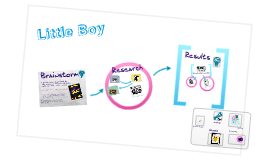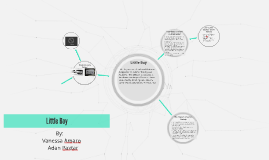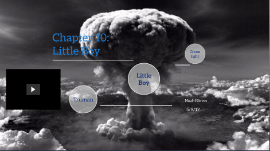Little Boy
Transcript: Innocence of Childhood Understanding Childhood The Imagination of a Little Boy Childhood spans from birth to adolescence, integral for cognitive and emotional development. During these formative years, children explore their environment through interaction and observation, laying the foundations for future learning and personality development. A little boy’s imagination transforms the ordinary into extraordinary adventures, often influenced by surroundings and experiences. This cognitive creativity develops problem-solving skills and emotional processing through storytelling and play. Learning Through Exploration Importance of Play Exploration is fundamental to learning in childhood, allowing children to engage their senses and curiosity. Through observation and experimentation, children acquire knowledge and build a sense of agency in their world. Characteristics of Innocence Play is essential for childhood development, providing opportunities for social interaction and cognitive challenge. Through play, children learn negotiation skills, teamwork, and coping strategies, crucial for later life. Innocence in childhood is marked by a lack of experience and a natural inclination toward trust and wonder. This purity invites unfiltered joy and creativity, fostering emotional resilience and openness to new experiences. Little Boy Dreamscapes Fantasies and Adventures A Journey Through Innocence and Imagination Heroes and Role Models Childhood is often marked by rich fantasies where the boundaries of reality blur. A little boy's adventures can lead him to magical lands filled with dragons, superheroes, and treasures, developing creativity and problem-solving skills essential for adult life. Little boys often look up to heroes from various realms, including comic books, movies, and real-life figures. This admiration shapes values, ambition, and dreams, influencing their self-identity and aspirations as they navigate their formative years. Storytelling in Childhood Impact of Media and Literature Storytelling is a foundational aspect of childhood that stimulates imagination and teaches moral lessons. Reading or listening to stories allows boys to explore new ideas, cultures, and perspectives, establishing a basis for empathy and creativity. Media and literature play a critical role in shaping the dreams and aspirations of a little boy. Exposure to diverse narratives can influence values, perspectives, and encourage critical thinking, reflecting how media literacy is vital in today's society. Growth and Development Educational Milestones Emotional Development Key educational milestones include developing language skills, problem-solving abilities, and basic literacy. These milestones lay the groundwork for future academic success and lifelong learning habits. Emotional development in a little boy includes recognizing and expressing feelings. It's essential for building self-esteem and forming attachments, influencing future relationships and social competencies. Bridging Childhood to Adolescence Transitioning from childhood to adolescence involves significant changes in identity and self-perception. This period is crucial for mental and emotional growth, influencing future behaviors and attitudes. Social Interactions Navigating Challenges Children face numerous challenges, such as adapting to new environments or overcoming fears. Addressing these issues helps build resilience, essential for tackling future obstacles in life. Social interactions play a pivotal role in a little boy's understanding of social norms and boundaries. Engaging with peers fosters skills like empathy, cooperation, and conflict resolution.

















